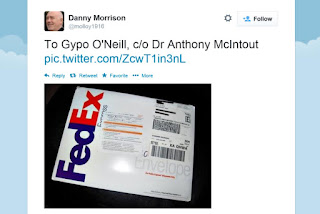Irish News ✏ Written by John Manley.
Danny Morrison on Freddie Scappaticci and how the north has transformed but unionism hasn’t changed
Danny Morrison has witnessed dramatic changes in his 72 years.
A teenager at the beginning of the conflict, he has lived to enjoy the fruits of the electoral seeds he and others sowed in the 1980s, with Sinn Féin now topping the polls in Westminster, Stormont and council elections.
But electoral success doesn’t automatically deliver political solutions.
“The objective is to improve people’s lives, to move resources from the rich towards the poor, but obviously they (the Sinn Féin-led Stormont executive) are constrained by being connected to Westminster and the British exchequer,” he says.
“But I have never viewed Stormont as a permanent institution. To me, this is an experiment and it’s an experiment that unionists continually undermine.”
He argues that rather than “quote unquote making Northern Ireland work, unionists do the exact opposite”.
He accuses unionist politicians of a failure to reciprocate gestures by republicans, such as Michelle O’Neill laying a wreath at the Belfast cenotaph or attending King Charles‘s coronation.
But despite intransigence, Morrison says he has seen northern society transform.
Danny Morrison on Freddie Scappaticci and how the north has transformed but unionism hasn’t changed
Danny Morrison has witnessed dramatic changes in his 72 years.
A teenager at the beginning of the conflict, he has lived to enjoy the fruits of the electoral seeds he and others sowed in the 1980s, with Sinn Féin now topping the polls in Westminster, Stormont and council elections.
But electoral success doesn’t automatically deliver political solutions.
“The objective is to improve people’s lives, to move resources from the rich towards the poor, but obviously they (the Sinn Féin-led Stormont executive) are constrained by being connected to Westminster and the British exchequer,” he says.
“But I have never viewed Stormont as a permanent institution. To me, this is an experiment and it’s an experiment that unionists continually undermine.”
He argues that rather than “quote unquote making Northern Ireland work, unionists do the exact opposite”.
He accuses unionist politicians of a failure to reciprocate gestures by republicans, such as Michelle O’Neill laying a wreath at the Belfast cenotaph or attending King Charles‘s coronation.
But despite intransigence, Morrison says he has seen northern society transform.
Continue @ Irish News.























